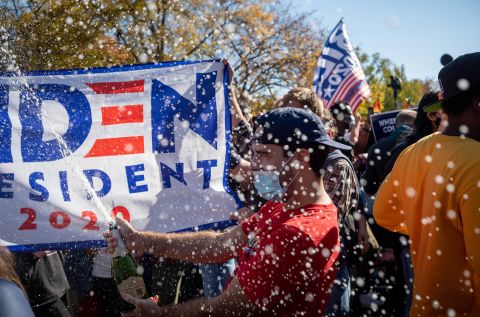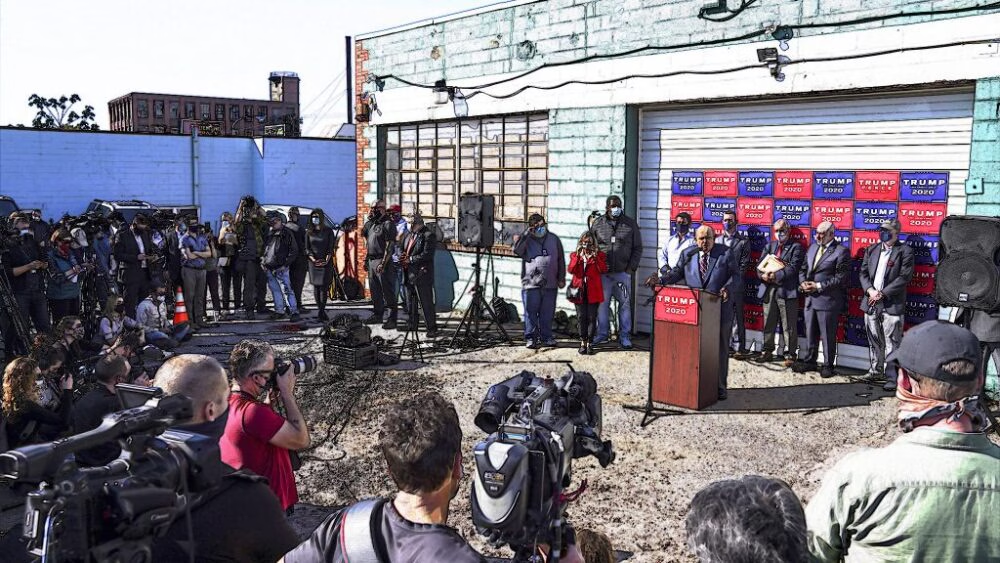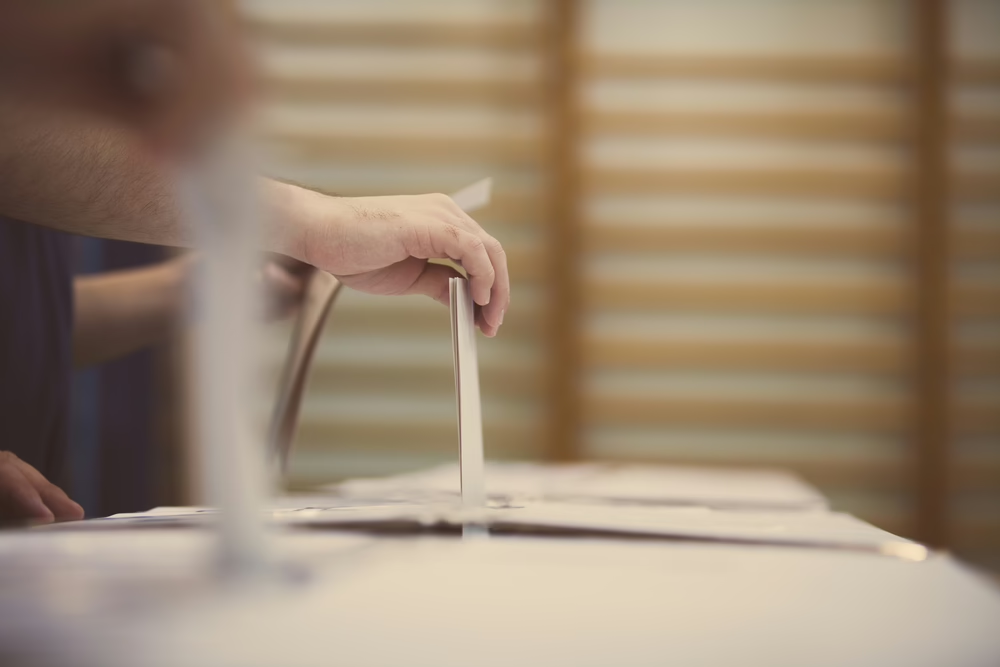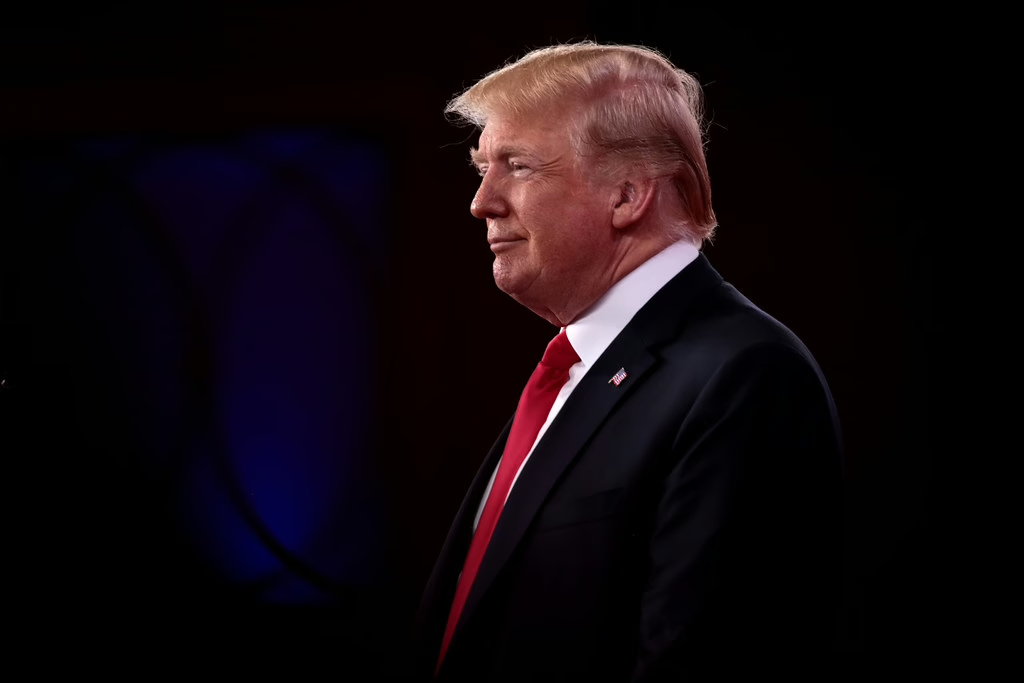After Electoral Loss, a Presidential Assault on American Democracy
Despite facing an insurmountable deficit in key battleground states, President Trump has embarked on a full-fledged campaign to delegitimize the election results, which started with his premature declaration of victory on Election Night. The President and his allies have lied about a rigged election and filed frivolous lawsuits in an attempt to call the results into question and erode the public’s trust in American democracy.
It has become mathematically impossible for the President to win after Pennsylvania was called for Joe Biden on Saturday. Nevertheless, he still has not conceded, and on Monday evening, Attorney General William Barr authorized federal prosecutors to investigate specific instances of voter fraud before the election results are certified. The DOJ’s top elections crime lawyer immediately resigned in protest.
1. Do these lawsuits or claims of fraud have merit?
No. Prominent conservatives, including some who voted for the President, have warned against or rebutted several voting-related conspiracy theories.
In regards to litigation, comprehensive surveys of the Trump campaign’s ongoing lawsuits can be found here, here, and here.
Some Trump lawsuits, such as a series of legal filings in Pennsylvania, have sought to invalidate election results entirely. One suit, filed Monday, alleges that their campaign observers were kept too far away from poll workers in Philadelphia. On those grounds, the Trump campaign has asked to nullify the entire election in Pennsylvania.
Meanwhile, the Trump campaign has filed other lawsuits in order to promote conspiracy theories like the #SharpieGate controversy. An Arizona woman claimed that her ballot had been invalidated after she was tricked into using Sharpie. In fact, Sharpie is perfectly acceptable for filling out ballots in Arizona, and the claim has been debunked by the Maricopa County Department of Elections, Arizona Secretary of State Katie Hobbs, and even the US Department of Homeland Security.
Republican and Democratic secretaries of states, attorneys general, and elected officials from across the country have stated on the record that there is no evidence of widespread fraud. Accordingly, the Trump campaign has lost every voter fraud suit it has filed.
2. Is there any way the election results could be overturned?
It’s theoretically possible, but incredibly unlikely.
This was not a close election. In each of six key battleground states, Biden leads by over ten thousand votes. In Pennsylvania, as of Wednesday, he leads by 47,603 votes. In Georgia, Biden leads by 14,112 votes. In Arizona, Biden leads by 12,813 votes. In Michigan, Biden leads by 148,645 votes. In Wisconsin, Biden leads by 20,539 votes. In Nevada, Biden leads by 36,726 votes. By comparison, the Florida election in 2000 that ultimately gave the presidency to George W. Bush was decided by 537 votes.
Attorney General Barr’s Monday night memo explicitly states that prosecutors may not conduct an investigation unless there are “clear and apparently-credible allegations of irregularities that, if true, could potentially impact the outcome of a federal election in an individual State.” Assuming federal prosecutors found some instances of voter fraud, there would surely not be enough to overturn an entire state’s election. Joe Biden’s large margins of victory would likely dissuade Republican legislatures from sending alternate slates of electors, as some people feared.
Finally, in the hypothetical scenario that President Trump manages, through a series of lawsuits, federal investigations, and/or the cooperation of a state legislature to nullify or overturn one state’s election results before the December 8 deadline, he would still need to replicate the feat in at least two more states to win re-election.

Credit: David Butow/Redux
America and the World React to Biden’s Presumptive Win
As news outlets projected Joe Biden to be the president-elect on Saturday, Nov. 7th, many in American cities flooded the streets in celebration. Despite the pandemic, impromptu crowds gathered and cheers erupted across New York City, Boston, Chicago, Minneapolis, Atlanta, Miami, Los Angeles, Philadelphia, and Wilmington, Delaware, Biden’s hometown. Some political analysts remarked that the United States was acting as if it had just overthrown a dictator.
But, of course, not everybody was happy. Supporters of President Trump have expressed the kind of disappointment and sorrow felt by supporters of Hillary Clinton after the 2016 election. What makes this election different however, is that some have refused to accept the result. Chagrined Trump supporters mounted “stop the steal” protests in Boston, MA; Austin, TX; Colorado Springs, CO; Salem, OR; Albuquerque, NM; Nashville, TN; Lansing, MI; Boise, ID; and Phoenix, AZ. There, they chanted “This is not over,” “Trump won,” and “We will win in court.” Dozens of police officers were called into northeast Philadelphia to contain clashes between Trump and Biden supporters outside a pro-Trump press conference.
The stark difference in these reactions is a testament to the deeply polarized times we live in, an atmosphere in which even the legitimacy of the electoral process can become a partisan issue.
1. How has the world reacted?
Many abroad reacted to Biden’s win in the same way as his American supporters: with jubilation and relief. Church bells rang in Paris, crowds danced near the American embassy in Berlin, and fireworks could be seen across London.
A large number of world leaders, including several who had cultivated close ties with President Trump (including Prime Ministers Benjamin Netanyahu of Israel, Boris Johnson of Britain, Narendra Modi of India, and Viktor Orban of Hungary as well as Crown Prince Mohammed bin Salman of Saudi Arabia and Turkish strongman Recep Tayyip Erdogan), have publicly congratulated the president-elect. Indian, Jamaican, and African leaders also praised the groundbreaking nature of Kamala Harris’ ascension to Vice President.
Notably, in a break from custom, Russia’s Vladimir Putin and China’s Xi Jinping have thus far declined to congratulate Biden. Both were among the first to call Trump in 2016. Trump-aligned Brazilian President Jair Bolsonaro and Mexican president Andres Manuel Lopez Obrador (who says he will reach out once all litigation is resolved), have also stood by without comment.
2. How have Republican politicians responded?
The vast majority of Republicans have taken the largely unprecedented step of failing to acknowledge the president-elect. Senate Majority Leader Mitch McConnell, the most senior congressional Republican, disdainfully remarked: “Let’s not have any lectures about how the president should immediately, cheerfully accept preliminary election results from the same characters who just spent four years refusing to accept the validity of the last election.” Secretary of State Mike Pompeo threw further gas on the fire when he said (likely in jest, but not very humorously) that “There will be a smooth transition to a second Trump administration.”
The nonpartisan Center for Presidential Transition felt it necessary to go as far as to issue a statement saying, “the outcome is sufficiently clear that the transition process must now begin” which was signed by former Republican Utah governor Mike Leavitt and Bush Administration Chief of Staff, Josh Bolten.
Only a small number of Republican lawmakers, including former President George W. Bush, four senators, and about a dozen representatives and governors, acknowledged Biden’s presumptive victory.
___
A Major Development on a COVID-19 Vaccine Brings Hope
On Monday, U.S. pharmaceutical company Pfizer — along with its German partner, BioNTech — announced that an early analysis of their COVID-19 vaccination shows it to be tremendously effective.
An independent board of experts analyzed Pfizer’s trial data and found that the vaccine is over 90% effective. This analysis was done based on numbers derived from Pfizer’s 44,000 person trial where they gave half of the participants the vaccine and the other half a placebo. Out of those 44,000 participants, only 94 got COVID-19. And, the overwhelming majority of those 94 infected people got the placebo, not the real vaccine.
Dr. Anthony Fauci notes that there are “still some questions” about how effective it is among older people versus younger people. Moreover, the vaccine must be held in ultra-cold temperatures (-94 degrees fahrenheit) making it harder to administer.
With that said, this is still a huge deal. To put the 90% efficacy rate in perspective, the flu vaccine for the 2018-2019 season was only 29% effective.
On Monday, the stock market rallied in response to the news. The S&P 500 rose 3.6% after the initial announcement and the Dow Jones Industrial Average rose more than 800 points. This was driven primarily by optimism that a vaccine may be widely available in the coming months.
What does this mean for you?
The vaccine will not be approved for a few more weeks. The FDA needs two months of data on at least half of the trial participants in order to ensure the vaccine is safe. Once it is approved, Pfizer is slated to receive 2 billion dollars from the Trump administration to aid in production. However, this won’t necessarily translate to access for average Americans anytime soon.
Pfizer has said that it expects to produce 50 million doses of the vaccine in 2020. Because the vaccine is administered in two doses, that is enough for 25 million people. The first to get the vaccine will be those at highest risk for infection and those at highest risk to contract severe cases — such as front line workers and the elderly.
By the summer of 2021, the vaccine is expected to be widely available. At that point, President-elect Joe Biden has said “it has to be free to everyone — whether or not you’re insured,”
The 1.3 billion doses that Pfizer plans to produce in 2021 will have a massive impact, but it still won’t be enough for us to put this pandemic behind us. As the Wall Street Journal notes, “Other Covid-19 vaccines in development will likely be needed for everyone to get vaccinated.” On the bright side, Dr. Fauci recently said that another company, Moderna, will be releasing trial results very soon.






